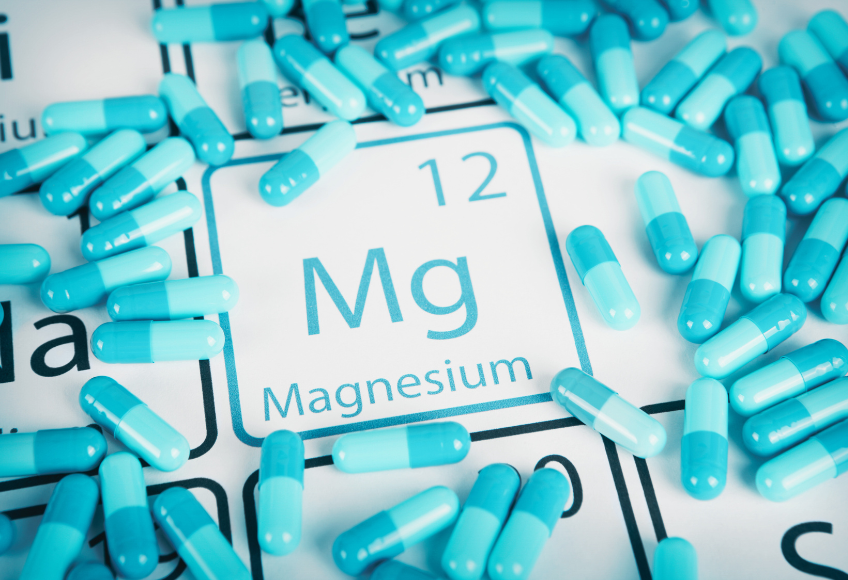
Magnesium-interactions and co-factors
Magnesium is a real power mineral that is involved in over 300 metabolic processes in the body. But its effect does not develop alone. It interacts with many other nutrients that improve its recording or support its functions in other ways. Maybe you've already thought about why, despite nutritional supplements, you don't feel the desired effect. A key could be the right interaction of these fabrics. Here you will learn everything important about the interactions of magnesium with other minerals and vitamins and which CO factors you should consider in order to get the optimal benefit from your supplement.
Magnesium and his tasks in the body
Before we go into detail, let's go into why magnesium is so important. Magnesium is a co-factor of more than 600 enzymes and regulates a variety of biochemical reactions and cellular functions. In particular, it is regulator of stimulus transmission, muscle contraction, cardiac arrhythm, vascular tone, blood pressure and bone turnover. It is not only essential for muscle function and the nervous system, but also supports heart health, bone strength and the energy metabolism. It also helps to maintain the electrolyte balance and reduce inflammation in the body. And it also plays a major role in histamine intolerance: Magnesium supports the enzyme dao (Diaminoxidase) as a co-factor, which builds histamine.
A magnesium deficiency can reduce the DAO activity and thus help to reduce histamine. A very big defect can even trigger histamine intolerance. A sufficient magnesium supply can therefore help relieve the symptoms of histamine intolerance. A sufficient magnesium supply also promotes muscle relaxation, regulates blood sugar levels and plays a crucial role in protein synthesis and cell division. But all of this only works if the other necessary nutrients are sufficiently available.
Share information about your brand with your Customers. Describe A Product, Make Announcements, Or Welcome Customers to your Store.
The most important co-factors of magnesium
Co-factors are nutrients that work in combination with magnesium to optimize its effect in the body. Here are the most important co-factors that you should pay attention to:
1. Calcium
Magnesium and calcium have a close relationship with each other, because they act as a "opponent" who together regulate the muscle function. While magnesium relaxes the muscles, calcium ensures contraction. Dieses Zusammenspiel ist besonders für die Herzgesundheit und Muskelaktivität entscheidend. The relationship between magnesium and calcium should be right. An ideal ratio is about 2: 1, i.e. two parts calcium on a part of magnesium. Too much calcium can inhibit the magnesium intake and thus disturb the balance of the two minerals. In such a case, the body could develop symptoms of a magnesium deficiency, even if enough magnesium is fed. In order to be on the safe side, you should not only pay attention to the intake of calcium, but also to the amount of magnesium in your diet and with supplementation.
Share information about your brand with your Customers. Describe A Product, Make Announcements, Or Welcome Customers to your Store.
Image with text
Advertising
Basics combines important vitamins, antioxidants and mineralsthat the body needs with a low -histamine diet.
The Basics Formula with Calcium, vitamin C, magnesium, quercetin and copper is an important building block with a low -histamine diet.
2. Vitamin D
Vitamin D and magnesium have a mutual relationship. Magnesium is necessary so that vitamin D is converted into its active shape. This form is that can then have its effect in the body, for example to improve calcium intake in the intestine. However, vitamin D also supports magnesium intake by improving the transport of the mineral in the body. A lack of one of the two nutrients can therefore affect the effect of the other. Therefore, with a vitamin D supplementation, you should always make sure that you take up enough magnesium. Otherwise, the additional intake of vitamin D could exhaust the magnesium reserves and trigger symptoms such as muscle cramps or nervousness.
3. Vitamin B1 and B6
These two vitamins are essential for magnesium intake in the intestine. Vitamin B1 (thiamin) helps to smuggle magnesium through the intestinal wall, while vitamin B6 (pyridoxin) ensures that the magnesium gets into the cells where it is needed. Studies have shown that the combination of magnesium and vitamin B6 is very effective when relieving symptoms such as PMS or stress -related fatigue. Vitamin B6 facilitates the transport of magnesium via the cell membranes and thus ensures that more magnesium arrives at its place of activity.
4. Potassium
Magnesium and potassium are also closely linked. Both minerals work together to ensure the function of the muscles and nerves. Potassium is primarily responsible for maintaining the tension of the cell membranes, while magnesium regulates the electrical excitement of the cells. A lack of magnesium can lead to a potassium loss, since magnesium helps to keep potassium in the cells. So if you have a magnesium deficiency, this can also have an impact on your potassium balance - which can lead to muscle cramps, cardiac arrhythmias or fatigue. This connection can be felt, especially in times of high physical stress, in sporting activities or heat, if you sweat a lot.
Share information about your brand with your Customers. Describe A Product, Make Announcements, Or Welcome Customers to your Store.
Interactions with other minerals
In addition to the co-factors, there are also minerals that are in competition with Magnesium or can inhibit their recording. You should keep an eye on these opponents to ensure that your supplementation is efficient.
1. Zink
Zinc is a vital trace element that takes on many functions in the body - from immune defense to fertility. There are indications that zinc and magnesium compete with each other if they are taken at the same time. The magnesium intake in the intestine can inhibit too much zinc. This does not mean that you shouldn't take zinc and magnesium together, but it is advisable to pay attention to the dosage. In stressful situations, in the event of infections or increased stress needs, additional use of both nutrients can be useful to optimally supply the body.
2. Iron
An excess of iron can affect magnesium intake, especially if iron is fed in high doses. This is because iron and magnesium use similar transport routes in the intestine. Especially in women who take additional iron due to menstruation or pregnancy, magnesium intake should be considered to prevent deficiency symptoms.
3. Selen
Selen is a strong antioxidant and important for thyroid function and immune defense. Interestingly, selenium interacts in a positive way with magnesium by reducing the oxidative stress that can arise in the event of a magnesium deficiency. Adequate supply of both nutrients is therefore particularly important for stress or inflammatory diseases.
Share information about your brand with your Customers. Describe A Product, Make Announcements, Or Welcome Customers to your Store.
Practical tips for taking magnesium and other nutrients
Now that you know how magnesium works with other nutrients, a few practical tips come on how to optimize the effect of your nutritional supplements:
⏰ Timing: It is best to take magnesium separately from high -dose zinc or iron to avoid interactions. A good time is in the evening before going to bed, since Magnesium also has a calming effect on the nervous system.
➕Combinations: Pay attention to preparations that offer meaningful combinations, such as B. Magnesium and vitamin B6 to improve absorption. Combined preparations with vitamin D and magnesium are also a good choice.
🥦 Nutrition: Try to increase your magnesium intake through nutrition. Food, particularly magnesium -rich foods are green leafy vegetables, nuts, seeds and whole grain products.
🧡 Individual needs: Adjust your supplementation to your individual needs. Athletes, pregnant women or people with histamine intolerance often have a higher magnesium requirement. Even in the case of diseases of the intestine such as Crohn's disease and irritable bowel syndrome, magnesium cannot be absorbed by food. Age can also play a role: over the years, magnesium intake is more difficult. Medicine intake can cause magnesium to be excreted more over the urine. This can be, for example, in gastric acid inhibitors, ACE inhibitors, diuretics and laxatives. In the event of stress and allergic reactions, we have an increased need. In addition to calcium, magnesium is another essential micronutrient for you. Please make sure that you avoid the citrate, because they are often more incompatible for HIT.
👉🏼 You can also find magnesium in our Histabalance® Basics! It combines important vitamins, antioxidants and minerals that the body needs in a low -histamine diet. The Basics Formula with calcium, vitamin C, magnesium, quercetin and copper is an important component in a low -histamine diet.
Share information about your brand with your Customers. Describe A Product, Make Announcements, Or Welcome Customers to your Store.
Conclusion: find the right balance
With a balanced diet and well -thought -out nutritional supplements, you can make sure that your body receives all the nutrients that it needs for optimal function. Especially with specific needs such as histamine intolerance, magnesium can help you feel more comfortable again. So pay attention to the right combinations and remember: health is always an interaction of many factors. Magnesium is an important player in this team, but it only wins the game together with the other nutrients.
Share information about your brand with your Customers. Describe A Product, Make Announcements, Or Welcome Customers to your Store.
Conclusion
The bile acid loss syndrome is an underestimated and not very well -known disease, which can, however, have a significant impact on the quality of life. If you suffer from chronic diarrhea, abdominal pain or other unspecific symptoms, this could be an indication of a bile acid loss syndrome. As with histamine intolerance, the diagnosis often requires patience and a thorough examination, but there are effective measures that can help you to alleviate the symptoms and get your life under control. With the right nutrition, the use of bile acid binders and an adaptation of your lifestyle, you can get many of the stressful symptoms under control and enjoy your everyday life again. Do not forget that if you suspect a bile acid loss syndrome, you should always see a doctor in order to obtain a precise diagnosis and suitable therapy. This is the only way to ensure that you get the best possible treatment and avoid long -term health damage.
Share information about your brand with your Customers. Describe A Product, Make Announcements, Or Welcome Customers to your Store.

From those affected for those affected
We are Thomas and Michaela Zinser, founder of Histaminikus.
Because of the own histamine intolerance of Michaela and our son, we founded Histaminikus. The frustration does not find any suitable histamine food has spurred us to develop low -histamine food.
We would like to give you back a piece of quality of life. Feel free to look around with us.
Kind regards
Thomas and Michaela







